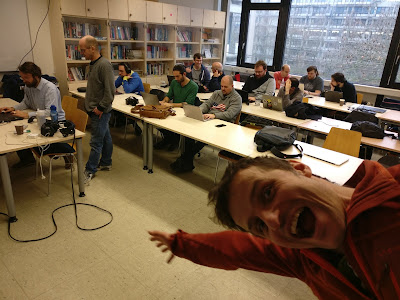All the interpreters are based on much the same codebase, thus the triple release.
- PyPy2.7, which is an interpreter supporting the syntax and the features of Python 2.7
- PyPy3.5, which supports Python 3.5
- PyPy3.6-alpha: this is the first official release of PyPy to support 3.6 features, although it is still considered alpha quality.
Until we can work with downstream providers to distribute builds with PyPy, we have made packages for some common packages available as wheels.
The GC hooks , which can be used to gain more insights into its performance, has been improved and it is now possible to manually manage the GC by using a combination of gc.disable and gc.collect_step. See the GC blog post.
We updated the cffi module included in PyPy to version 1.12, and the cppyy backend to 1.4. Please use these to wrap your C and C++ code, respectively, for a JIT friendly experience.
As always, this release is 100% compatible with the previous one and fixed several issues and bugs raised by the growing community of PyPy users. We strongly recommend updating.
The PyPy3.6 release and the Windows PyPy3.5 release are still not production quality so your mileage may vary. There are open issues with incomplete compatibility and c-extension support.
The utf8 branch that changes internal representation of unicode to utf8 did not make it into the release, so there is still more goodness coming. You can download the v7.0 releases here:
http://pypy.org/download.htmlWe would like to thank our donors for the continued support of the PyPy project. If PyPy is not quite good enough for your needs, we are available for direct consulting work.
We would also like to thank our contributors and encourage new people to join the project. PyPy has many layers and we need help with all of them: PyPy and RPython documentation improvements, tweaking popular modules to run on pypy, or general help with making RPython's JIT even better.
What is PyPy?
PyPy is a very compliant Python interpreter, almost a drop-in replacement for CPython 2.7, 3.5 and 3.6. It's fast (PyPy and CPython 2.7.x performance comparison) due to its integrated tracing JIT compiler.We also welcome developers of other dynamic languages to see what RPython can do for them.
The PyPy release supports:
Unfortunately at the moment of writing our ARM buildbots are out of service, so for now we are not releasing any binary for the ARM architecture.
- x86 machines on most common operating systems (Linux 32/64 bits, Mac OS X 64 bits, Windows 32 bits, OpenBSD, FreeBSD)
- big- and little-endian variants of PPC64 running Linux,
- s390x running Linux
What else is new?
PyPy 6.0 was released in April, 2018. There are many incremental improvements to RPython and PyPy, the complete listing is here.Please update, and continue to help us make PyPy better.
Cheers, The PyPy team


